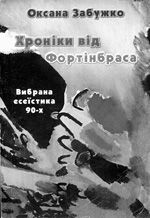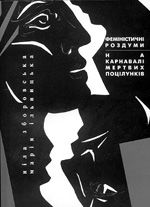Three books written by women and published simultaneously is an extraordinary event in Ukraine. I have in mind Oksana Zabuzhko’s Chronicles from Fortinbras: Selected Essays of the 1990s, Vira Aheyeva’s The Poetess at the Turn of the Century, and Nila Zborovska’s (pen name of Mariya Ilnytska) Feminist Contemplation: At the Carnival of Dead Kisses. Their presentation recently took place at the Institute of Literature.
Secreted behind the colorful paperbacks are at least three other women’s names: Lesia Ukrainka as the heroine of interpretations in Vira Aheyeva’s monograph; Simone de Beauvoir who is held in the highest esteem and quoted most frequently in all three works, and Solomiya Pavlychko, without whose studies and ideas there would have been no Center of Gender Studies, where the three authors work so fruitfully, nor the books mentioned. With all respect due the authors and their copyrights, Solomiya Pavlychko was the one who developed the know-how of Ukrainian literary feminism at the end of the twentieth century.
Oksana ZABUZHKO as a literary figure emerges mostly from the image of a learned lady, member of an international academic chair where most essays included in her books were read as scientific papers. Long quotes, often occupying the whole page, supplements, digressions, associations, specific Ukrainian gossips, little plots and archaisms seem deliberately added as an additional super-cover, worked into the context of generally known problems of the twentieth century. Perhaps to make the reader struggle through that emotional, image-bearing jungle teeming with ideas, suffering from a physical or mental headache, finally getting into the clear filled with holy rage against all those idiotic and horrifying phenomena of this totalitarian century. Ms. Zabuzhko brings herself and the reader to the verge of decency, getting emotional in a typical Ukrainian woman’s way, cursing and spitting (actually, she admits as much). Her publicist vigor, along with expletives, serves as a humiliating ecumenical generalization. While at the early 1990s it referred to the horrifying post-Soviet experiment with people’s lives, an essay dating from 1999 deals with the national Ukrainian character. One is tempted to ask whether if we Ukrainians are so much debased and culturally anemic, why should the author (stressing constantly that she is a poet in the first place) use such dirty invectives, addressing potency. Maybe behind all this is her quest for a true literary lover of our time?
Nila ZBOROVSKA appears to have borrowed much from Oksana Zabuzhko by way of self-representation. In her book she emerges as “one with two faces,” as a literary critic regularly published by the Ukrainian press under her real name, and as a prose writer using an attractive pen name. She is a scholarly lady interpreting modern Ukrainian literature along gender lines and betraying typical traits as a literary gossip, collecting bits and pieces shedding light on the private life of literati. In fact, she relishes every juicy detail, enhancing this fashionable subject using surzhyk [our inimitable mixture of illiterate Ukrainian and Russian with occasional distorted English borrowings], making the whole thing an endless creative intercourse. And her dead kisses are simply a backdrop against which unfold far more exciting sensual events in rural and urban setting, all those beddings (Nila Zborovska’s pet word in her Feminist Contemplation). Her book turns into a literary topless party, with literature and sex being requisites. And the author obviously tries to playfully describe and seriously analyze their interrelationships. Incidentally, with Mariya Ilnytska certain details of Ukrainian provincial women’s life are more penetrating than Nila Zborovska’s “sketches from nature” portraying literary adventuresses.
The monograph by Vira AHEYEVA appears as a striking dissonance between expressive language, faultless composition, and complete typographic failure. Zabuzhko’s and Zborovska’s books put out by Kyiv’s Fakt and Lviv’s Litopys Publishers, respectively, looks definitely more artistic. In Aheyeva’s case all the Lybid University Press managed is a banal painted graphic pattern a la Ukrainian fin de siecle. The Poetess at the Turn of the Century is the author’s sequel to Lesia Ukrayinka’s creative heritage and the tradition of its interpretation. Aheyeva turns postmodernism, regarded by many as a Western intellectual hybrid, into an effective method. The book is rich in facts from Lesia Ukrainka’s life heretofore little known if at all: excerpts from correspondence, contemporary reviews, stories, and gossip about the poetess. One is amazed by Aheyeva’s skill at calmly discussing the most sophisticated intimate aspects, although at times her narrative reminds one of a dull lecture delivered by a female scholar addressing a professional audience which, of course, will irritate lay readers.
Hopefully, the three books will sooner or later bring forth reviews, commentaries, and interpretations from the younger feminist generation. In fact, this response must come, considering another “feminine” book, Language and Power, published previously. Thanks to the International Renaissance Foundation, the Ukrainian public received 4,000 copies of feminist provocations on the eve of March 8 [still marked as International Women’s Day here].









